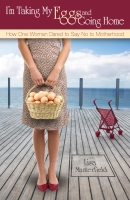 Remember this children’s ditty? I’m using myself and my husband as the example.
Remember this children’s ditty? I’m using myself and my husband as the example.
Jose and Lisa sitting in a tree,
K.I.S.S.I.N.G.
First comes love,
Then comes marriage,
Then comes a baby in a baby carriage.
As a little girl, this was the expectation for how my life would unfold. Find a nice man, get married, and have a family, just as my parents did, and their parents before them. Sure, I came of age in the 80s, so there was college, a career, travel, and other big dreams thrown in there, but marriage and children were always a part of the picture.
I was 34 years old when I finally married Mr. Fabulous. Four years later, a doctor told me I’d never have biological children of my own. Those first years of our married lives were a crazy rollercoaster of desire and desperation, filled with doctor’s appointments and a desperate drive to complete my image of the perfect family. Even after this hopeless diagnosis, I kept pursuing that dream, convinced that the next doctor would have the secret elixir or that adoption would be my quick-fix solution.
I think I could have continued to look for a solution forever – there was always something else to try – but I realized something from that children’s ditty. After all that kissing in trees, there are three things that are supposed to follow – love, marriage, and children. In my pursuit of the baby in the baby carriage, I was frittering away two: the love and the marriage. I already had a wonderful life, doing work that I loved, in a city that I loved, with someone I loved. If I never had children, I’d still have that wonderful life.
We live in a culture of high expectations, where, as women, we expect to be able to have it all. But anyone who’s lived for any length of time knows that you don’t always get what you want. I wanted motherhood, but it wasn’t meant to be, so I was left with two options: spend the rest of my life mourning what I’d lost and living with the hope that maybe a miracle would happen, or start figuring out how to build a life without children.
I chose the latter.
It was the hardest decision I’ve ever made, but now, two years later, I’m free to fully enjoy that fabulous marriage with that fabulous husband. Motherhood is only one small part of the life I imagined for myself and I am so much more than just an infertile woman. I discovered that there is life after infertility and that a life without children can still be a wonderful life.
For more information about infertility, please visit: http://www.resolve.org/infertility101
This post was written RESOLVE’S Bust a Myth Challenge. To learn more about National Infertility Awareness Week® (NIAW) go to: http://www.resolve.org/takecharge.











